GILGIT: Pakistan’s decision last week to free a popular political activist who was serving a life sentence in the country's semi-autonomous northern Gilgit-Baltistan area has been seen by observers as a “reconciliatory gesture” at a time when the administration of Prime Minister Imran Khan is gearing up to grant provincial status to, and uplift, the long-neglected region.
Baba Jan, a left-wing political activist from the Hunza Valley in Gilgit-Baltistan, which forms part of the disputed Kashmir region, was convicted under anti-terrorism laws in 2011 and lost an appeal against his life sentence in 2016. He was arrested for leading protests on behalf of his community over compensation for more than 6,000 people displaced by a devastating mountain landslide.
This October, thousands of people took part in a seven-day protest in Hunza asking for the release of Jan and other activists ahead of a legislative assembly election in Gilgit Baltistan on November 15. Jan was finally set free after the caretaker government struck a deal with the protesters that it would release 14 political prisoners by November 30 if they called off their sit-in.
Jan has vocally protested what he and supporters, as well as independent analysts, describe as political, constitutional and human rights violations in the region. The government denies this.
Observers have previously warned that Jan’s continued imprisonment was fuelling militancy and nationalist views in the region. His release, they say, has raised hope that the long suppressed and neglected region might see some improvements.
“Baba Jan 's sudden release showcases a grand reconciliation gesture from the government,” political observer and researcher Aziz Ali Dad of Hunza said. “Because Baba Jan was gaining more fame due to his imprisonment and grievances were gradually increasing among the public, so they released them [political prisoners] after election to get public sympathies as a good gesture.”
Analyst Afzal Shigri said it was a long-time demand of the people of the region that they get “constitutional rights” and the move to release the prisoners seemed to be a step in that direction.
Political analyst from Hunza, Amir Hussain, called the release of the prisoners, including Baba Jan, a “good gesture” from the federal government.
Gilgit-Baltistan, which borders Afghanistan and China, is the gateway of the $65 billion China-Pakistan Economic Corridor (CPEC) infrastructure plan, and Hussain said there might also now be Chinese pressure on Pakistan to “mainstream” the area, including by granting it provisional provincial status.
China denies it has ever interfered in Pakistan’s internal decisions.
Faizullah Faraq, a spokesperson for the Gilgit-Baltistan government, said the issue of Baba Jan and other political prisoners was a judicial matter and there had been no pressure from “external powers” to release them, and they had been freed as per a pact with protesters in October.
Gilgit-Baltistan, impoverished and remote, has never formally been part of Pakistan but rather of the larger Kashmir region that is also claimed by India.
Locals fought pro-India forces and opted to join Pakistan in 1948, a year after the partition of India after independence from British rule. But since then Gilgit-Baltistan has not been granted full inclusion by the Pakistani constitution, over fears doing so would jeopardize Islamabad’s international stance that all of Kashmir is disputed territory.
The local assembly, for which the November 15 elections were held, has few powers. Pakistan’s National Assembly and Senate have no representation from Gilgit-Baltistan, and the region receives only a fraction of the national budget. But Prime Minister Imran Khan has said recently his government will grant provisional provincial status to the region, giving it greater political representation.
Rights activists and reporters have also long spoken of human rights abuses in the region.
“Gilgit-Baltistan has erupted in protest a number of times over the last decade over a range of questions, including environmental issues, subsidies and autonomy,” an editorial in The News, a popular Pakistani Daily, said on Jan’s release.
“As the region has begun finding its political voice … there is now a need for a larger recognition that a return to the old status quo is not possible in Gilgit-Baltistan,” the editorial said. “A new consensus will need to be found in which the people of the region define their own needs and future. This will require activists like Baba Jan to be able to freely represent the voice of their people.”
On his part, Jan says him and other prisoners were “tortured and badly treated” while in jail.
“We were treated like professional culprits despite being political prisoners,” he told Arab News in an interview. “There were no facilities inside the jail for us.”
“Finally we were freed from the jail due to the public’s struggle and power,” he added. “And I want to thank all my well-wishers.”
But Arshad Wali, the deputy superintendent of Damas Jail in Gilgit-Baltistan where Jan was incarcerated from 2014 to 2020, rejected the claims the prisoners had been mistreated.
“In Damas jail, Baba Jan and other political prisoners were treated like common culprits,” he said, “as in GB there is no classification for political prisoners.”
Political prisoners' release in Pakistan’s north seen as ‘reconciliatory’ move ahead of provincial status plans
https://arab.news/g3yfm
Political prisoners' release in Pakistan’s north seen as ‘reconciliatory’ move ahead of provincial status plans
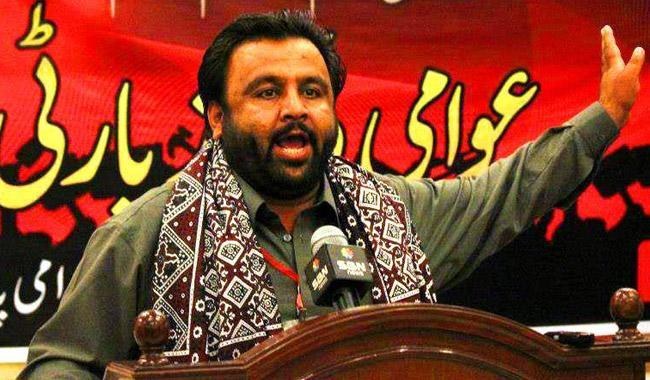
- Left-wing activist Baba Jan and over a dozen other political prisoners were released last month
- Analysts say the releases have raised hope the long neglected region might see improvements
Ex-PM Khan party reiterates call for judicial probe into May 2023 violence in Pakistan
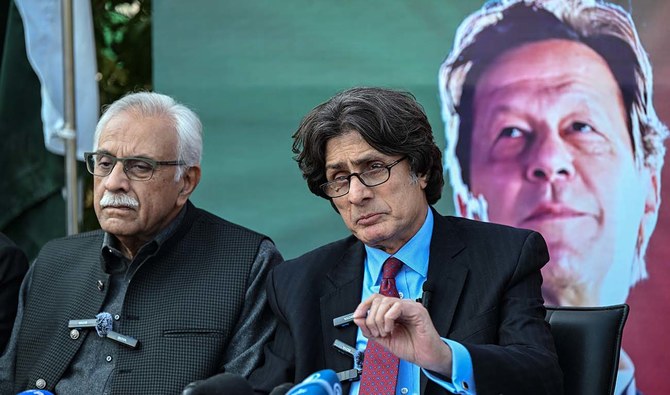
- Khan’s brief arrest on May 9, 2023 saw hundreds of his supporters allegedly ransack state buildings and vandalize public property
- A Pakistani military spokesman on Tuesday said it was important to punish May 9 perpetrators to restore trust in the justice system
ISLAMABAD: Jailed former prime minister Imran Khan’s Pakistan Tehreek-e-Insaf (PTI) opposition party on Tuesday reiterated its call for a judicial probe into violent protests that hit Pakistan on May 9, 2023 over Khan’s brief arrest in a graft case.
Khan’s arrest saw hundreds of his supporters allegedly pour into the streets across the country, ransacking military and other properties. Thousands were arrested in the aftermath and some were tried by military courts after the authorities promised to bring the perpetrators and instigators of the violence to justice.
The PTI says the May 9 incident was a “false flag operation” and the subsequent crackdown was aimed at keeping Khan, who was ousted from power in a parliamentary no-trust vote in April 2022, and his party from returning to power in Pakistan’s national election held in February this year, after being delayed for months.
Asked about the claims, a Pakistani military spokesman said on Tuesday the May 9 incident was not related to the military alone, but to the whole of Pakistan, noting that the protesters had attacked military installations, burnt the residence of the founder of Pakistan and vandalized martyrs’ monuments.
The spokesman, Maj-Gen Ahmed Sharif Chaudhry, said the perpetrators and facilitators of the riots needed to be brought to justice as per the constitution and law of the land to preserve the credibility and faith in the country’s justice system.
“See, all this what he has said, we challenge him on these things that all what he is saying, its proofs should be brought before the people,” Raoof Hasan, the PTI information secretary, said at a press conference.
“And the easiest way for that is, what we started demanding immediately after May 9, that an independent, transparent judicial inquiry be instituted, which established who committed the crime and who were behind them.”
Last week, the PTI also issued a circular and urged party members to hold rallies in every provincial assembly constituency to commemorate the May 9 protests, citing directives from Khan who has been in jail since August last year.
Khan, 71, was ousted in 2022 after falling out with Pakistan’s powerful military leaders who many say backed him into power in 2018. In opposition, he waged an unprecedented campaign of defiance against the military establishment which has directly ruled the South Asian nation for nearly half of its history.
Arguably Pakistan’s most popular politician, Khan says the cases against him are “politically motivated,” aimed at keeping him from returning to power. The military denies it.
Pakistani conglomerate Engro looks to go global, main investor says
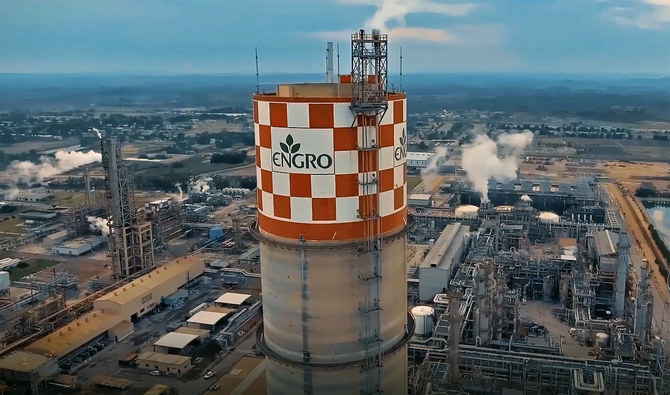
- The expansion plans include looking at telecom infrastructure in the Middle East, North Africa, and Central Asia
- Engro Corp. has a market capitalization of $694 million on the Pakistan Stock Exchange and assets of $2.9 billion
KARACHI: Pakistan’s largest conglomerate, Engro Corp, is looking to expand into new markets, including the Middle East, Central Asia and Africa, the chemicals-to-energy company’s largest investor said on Tuesday.
Speaking to Reuters in a rare interview, Samad Dawood, vice chairman of Dawood Hercules Corp, which owns 40 percent of Engro Corp, said the company was also considering global liquefied natural gas (LNG) opportunities as well as hydrogen energy.
The expansion plans include looking at telecoms infrastructure in the Middle East, North Africa, and Central Asia, while it is looking at Africa to expand its fertilizer businesses, he said.
Engro Corp. has a market capitalization of 193 billion rupees ($694 million) on the Pakistan Stock Exchange and assets of 802 billion rupees ($2.9 billion), according to public data.
The group has businesses across multiple sectors in Pakistan, including energy, fertilizer, telecommunications and consumer goods.
It owns 56 percent of Pakistan’s first LNG terminal, Engro Elengy Terminal Pakistan, which was set up in the southern city of Karachi in 2015. Dutch energy logistics giant Royal Vopak owns the remaining 44 percent.
The terminal fulfils 15 percent of Pakistan’s natural gas demand.
Dawood said Engro will continue to invest in the energy sector despite having sold its coal-based assets, and was exploring new avenues for sustainable energy production.
He said the company was talking to technology providers in the hydrogen energy sector to figure out how to use ammonia as an energy transition solution.
Dawood added that Pakistan was far from being energy-secure and there were plenty of opportunities to invest further in the power sector.
Pakistan has moved toward reliance on LNG after its own domestic gas supplies dwindled fast as consumption in the industrial and residential sectors increased.
’DREAMER’
Dawood said the global push was inspired by his late elder brother Shahzada, who perished last year in the ill-fated Titan’s voyage to explore the Titanic wreckage — an accident that made global headlines when the deep-sea submersible imploded and killed all five people on board.
“He (Shahzada) was much more of a dreamer and pushing us to become more international and building that curiosity and engaging with the outside world,” Dawood said.
The Dawood family also faced a protracted legal ordeal in Pakistan where the company was accused of getting illegal favors from the government.
The case, which lasted years, finally ended last week with the country’s accountability watchdog dropping the case entirely. Dawood says the matter hurt the family deeply and even impacted their businesses and potential investors.
The company’s plans to push ahead are taking shape, Dawood said. On Monday, the boards of Engro and Dawood Hercules approved in principle a restructuring plan to allow them more capital flexibility.
Dawood said the restructuring will allow for participation in “opportunities that the entire economy provides,” adding that the boards wanted the flow of capital to be completely seamless between the two organizations.
He said Engro would be able to expand its investment mandate to include exploring opportunities created by multinational corporations divesting from Pakistan’s troubled markets.
Saudi Arabia’s Crown Prince expected to visit Pakistan ‘any time’ during May — FM Dar
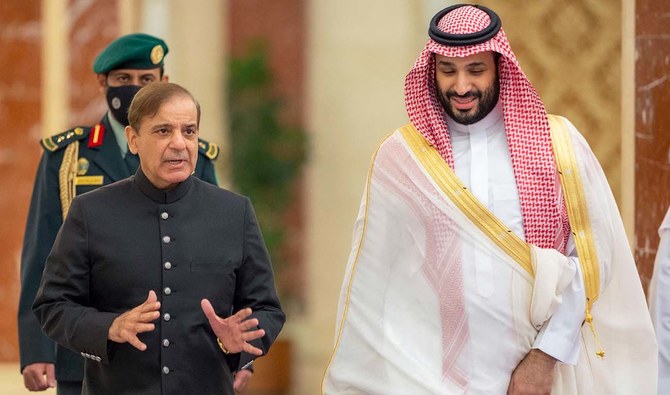
- The development comes after a flurry of high-level engagements between Pakistan and Saudi Arabia in recent weeks
- Both countries have been working closely to increase bilateral trade and investment in several diverse sectors
ISLAMABAD: Ishaq Dar, Pakistan’s deputy prime minister and foreign minister, on Tuesday said the much-awaited visit of Saudi Arabia’s Crown Prince Mohammed bin Salman to Islamabad was on the cards and could materialize “any time” during the month of May.
The statement follows a series of high-level engagements between the two countries, including the visits of Pakistan PM Shehbaz Sharif to the Kingdom and a visit of Saudi Foreign Minister Faisal bin Farhan to Islamabad.
The visit by the Saudi Crown Prince would mark his first trip to Pakistan in the last five years. His previous visit took place in February 2019 during the tenure of former prime minister Imran Khan.
“That visit [of Saudi Crown Prince] is due, which will happen any time during May,” Dar told reporters at a media briefing in Islamabad. “We will receive the final dates from there [Saudi Arabia] and as a foreign ministry, we are in touch and his visit as of now is on the cards.”
The Saudi Crown Prince accepted PM Sharif’s invitation to visit Pakistan during their meeting in Ramadan, according to Dar.
“He [Saudi Crown Prince] said that he will visit Pakistan after the initial government-to-government (G2G) and business-to-business (B2B) meetings,” the Pakistani foreign minister said.
Pakistan and Saudi Arabia have been working closely in recent weeks to increase bilateral trade and investment deals, with Crown Prince Mohammed bin Salman last month reaffirming the Kingdom’s commitment to expedite an investment package of $5 billion.
PM Sharif discussed increasing bilateral trade and investment in his meeting with the Crown Prince during Sharif’s visit to Saudi Arabia on April 6-8, according to Dar.
It was followed by the visit of a Saudi ministerial delegation, led by FM Prince Faisal, to Islamabad on April 15-16, during which Pakistan presented the Saudi delegation with an investment menu that was “meticulously prepared after extensive efforts.”
Following Sharif’s talks with the Crown Prince and other top Saudi officials in Riyadh, a 50-member, high-level delegation, led by the Kingdom’s Assistant Minister of Investment Ibrahim Al-Mubarak, arrived in Pakistan on Sunday to explore investment opportunities in the South Asian country.
“The Saudi Assistant Investment Minister has brought prominent private Saudi companies for B2B meetings as government could only involve in major projects such as Reko Diq, petrochemicals and mining,” he said, adding that his government had aligned Pakistani companies for matchmaking.
“While bilateral trade volume will be bolstered through the private sectors of both sides, the government will facilitate this process as demonstrated by our recent efforts.”
Dar said Pakistan’s future looked “promising” due to the rapid progress made on the bilateral trade and investment agenda, on the directives of the Saudi Crown Prince.
Pakistan and Saudi Arabia enjoy strong trade, defense, and cultural ties. The Kingdom is home to over 2.7 million Pakistani expatriates and serves as a top source of remittances to the cash-strapped South Asian country.
‘Wide potential’: Pakistani PM invites Japanese industrialists to invest in electric vehicle industry
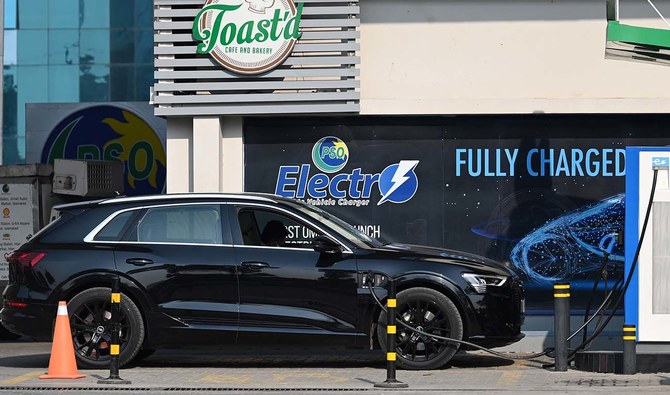
- The delegation, led by Japan’s Ambassador Wada Mitsuhiro, met PM Shehbaz Sharif to discuss various opportunities in Pakistan
- PM Sharif says his government has formed committee to resolve issues faced by Japanese firms expanding businesses in Pakistan
ISLAMABAD: Prime Minister Shehbaz Sharif on Tuesday met with a delegation of Japanese industrialists in Islamabad and urged them to invest in Pakistan’s electric automotive industry, Sharif’s office said, amid country’s push to attract foreign investment.
The delegation, led by Japan’s Ambassador to Pakistan Wada Mitsuhiro, met the prime minister to discuss various opportunities in Pakistan, according to PM Sharif’s office.
The Pakistan premier noted that Japan and Pakistan were longstanding friends and the two countries should further promote trade and investment ties in various sectors.
“There is a wide potential for investment in the electric vehicle industry in Pakistan and Japanese companies with the best technology can take full advantage of it,” Sharif was quoted as saying by his office.
“All problems faced by Japanese industrialists and businessmen will be overcome together.”
He noted that his government had formed a committee to resolve the issues faced by Japanese companies, who were expanding their businesses in Pakistan.
During the meeting, the Japanese ambassador informed the prime minister about the arrival of a delegation of 20 well-known Japanese companies to Pakistan in July, which would prove to be an important milestone for the promotion of investment and trade between the two countries.
“The delegation informed the Prime Minister that Japanese companies have started local production of hybrid vehicles in Pakistan,” Sharif’s office said. “The Prime Minister welcomed this move.”
The development comes amid Pakistan’s efforts to attract foreign investment to keep the frail $350 billion South Asian economy afloat.
The cash-strapped nation last month completed its $3 billion International Monetary Fund (IMF) program which helped avert a default last year, but the government of PM Sharif has stressed the need for a fresh, longer-term program.
Pakistan is expected to seek at least $6 billion and request additional financing from the Fund under the Resilience and Sustainability Trust.
PM Sharif says Saudi business delegation’s visit to benefit Pakistan’s economic future
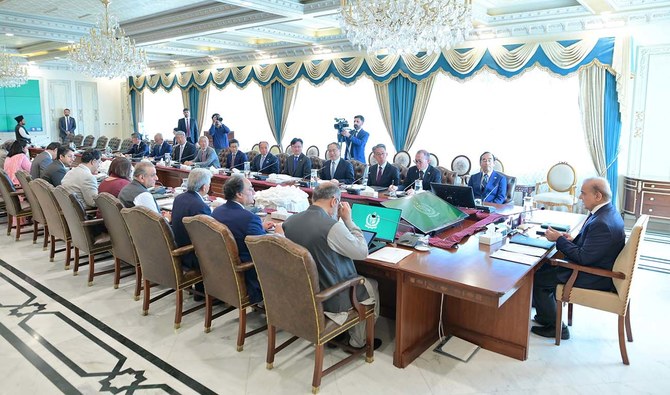
- The prime minister says the Saudi minister leading the delegation described it as ‘a new era’ for Pakistan
- Pakistan is seeking foreign investment to navigate a path to economic recovery as it seeks another IMF bailout
ISLAMABAD: Prime Minister Shehbaz Sharif expressed confidence on Tuesday the Saudi business delegation’s visit to Pakistan would prove beneficial for his country while applauding his cabinet ministers for playing a constructive role in their dealings with the visiting investors.
The delegation, which comprised representatives of 30-35 Saudi companies, was led by the kingdom’s Saudi Assistant Minister of Investment Ibrahim Al-Mubarak and arrived in Pakistan on Sunday.
Its members held several business-to-business meetings to explore investment opportunities in various economic sectors of the country.
The prime minister said in the opening remarks of the cabinet meeting the delegation was satisfied with its engagements in Pakistan before returning to the kingdom. He particularly mentioned the head of the delegation, saying he praised the performance of Pakistani ministers.
“He said, ‘We are very satisfied and happily returning.’ And he said, ‘I will report that we have seen a new era in Pakistan.’ In this, the commerce minister has a very big role, as does the ministers of petroleum and finance,” the PM told the cabinet meeting.
“It augurs very well for our future,” he added.
The kingdom’s business delegation’s visit to Islamabad followed Saudi Foreign Minister Prince Faisal bin Farhan’s visit to Islamabad last month, when he was briefed by the authorities on various avenues to invest in the country.
Pakistan is trying to navigate a path to economic recovery by securing an International Monetary Fund bailout.
It also needs foreign investment to help fight a chronic balance of payments crisis.










